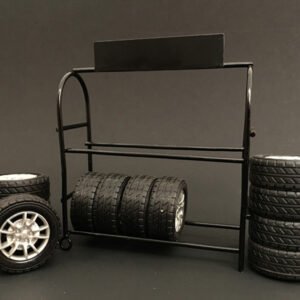Description
- Brand new 1/72 scale diecast model of Lockheed P-38 L-5-LO Lightning Fighter Aircraft “‘Putt Putt Maru’, Col. Charles McDonald, 475th FG USAF, Philippines” (1945) United States Air Force “The Aviation Archive” Series die cast model by Corgi.
- Brand new box.
- Has sliding door.
- Detailed exterior.
- True-to-scale detail.
- Includes display stand.
- Officially licensed product.
- Includes pilot figure in cockpit.
- Manufacturer’s original unopened packaging.
- Removable engine covers and opening canopy.
- Dimensions approximately Length- 6.25, Wingspan- 8.75 inches.
- Diecast metal and plastic construction for durability and a heavy, realistic feel.
- It is a highly detailed and accurate model, perfect for collectors and enthusiasts of military history.
- Realistic panel lines, antennas, access panels, and surface details for an authentic representation of the real-life airplane.
- HISTORY ASPECTS:
- Having seen the introduction of advanced monoplane fighter designs in both the German and Japanese air forces, America was only too aware that their own Air Force was in need of upgrade as a matter of urgency. To this end, an official requirement was issued in February 1937 for the production of a new pursuit fighter, an aircraft which would have to possess performance which had never previously been seen, not only on an American aircraft, but anywhere else in the world. The Lockheed Aircraft Company were one of six companies determined to satisfy this demanding requirement and entrusted the design of this radical new aircraft to talented designer Clarence ‘Kelly’ Johnson, who was basically given a free rein during its development.
- Almost immediately, he determined that a single engined aircraft could not satisfy these demanding specifications and started work on a twin engined design, one which featured twin booms to house the engines and superchargers, with a centrally positioned nacelle for the cockpit and the fighter’s heavy armament. The new aircraft looked incredible and was a radical departure from any fighter aircraft design that had gone before it, with Lockheed being awarded a contract to produce a prototype example. The XP38 was a thing of beauty and after just a short 38 minute maiden flight, everyone at Lockheed knew they had a winner on their hands. In fact, officials were so impressed with the aircraft’s performance that they immediately decided to make an attempt on the US Transcontinental speed record to highlight its potential, an attempt which saw the XP38 shatter the existing record by an impressive 23 minutes. Unfortunately, it appears that officials at the destination airport were not expecting the arrival of the strange new fighter and kept it holding so long that it actually ran out of fuel and had to make an emergency landing on a local golf course.
- Nevertheless, the aircraft had shown its potential and the US Army Air Force ordered sixty-six aircraft and America had their first 400 mph fighter. The introduction of the P-38 Lightning was not without its problems, however, this was not surprising bearing in mind its performance and configuration were so radically different to anything which had gone before it. Almost constant development would see the Lightning develop into a devastatingly effective high altitude interceptor and with engines which both drove outwardly rotating propellors, also eventually proved to be an incredibly stable aircraft. Possessing impressive range and firepower, the Lightning would eventually be used to avenge the Pearl Harbor attack, when sixteen P-38s of the 339th Fighter Squadron intercepted a bomber carrying Admiral Isoroku Yamamoto, the mastermind of that infamous raid, and shot it down.


 Cart is empty
Cart is empty 



